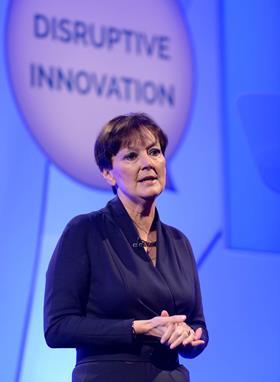
Supermarkets need to embrace shopper power and create solutions to keep pace with 'radical' changes in shopper habits.
This is one of the predictions based on new research, outlined by IGD chief executive Joanne Denney-Finch at today (6 October)'s The Big Debate in London.
Denney-Finch also stated her belief that over the next three years:
· Consumers' big weekly shop will keep getting smaller;
· There will be major changes in store layouts;
· We will reach tipping point for healthy eating;
· We will see bolder innovations from branded food and drink manufacturers
Joanne Denney-Finch, IGD chief executive, said: “There’s radical change ahead, as shoppers continue to call the tune in our industry.
“The big weekly shop will keep getting smaller. People are shopping more frequently than ever for their food and groceries, but over a third (36 per cent) would still shop even more often if their finances allowed it.
“While this poses a major challenge for superstores, which are designed round a big weekly shop, retailers and their suppliers are already reconsidering how to use their floor space to make their customers’ lives better and respond to cultural change. They are reducing the unnecessary complexity by decreasing the number of products available and improving layouts.
'It’s starting to work, with over half of superstore users feeling their enjoyment of shopping has improved, and yet more potential for superstores to really capitalise on this.”
On changes to store layouts, Denney-Finch noted: “One popular idea from shoppers is an everyday aisle for regular top-ups, so you don’t have to traipse round the store. An extension of this is a ‘Click and Collect Plus’ service, where staple groceries are ready to be collected when shoppers arrive at stores allowing more in-store space to build excitement around occasional purchases. This could be done through sampling, demonstrations and other special events.
“A more radical approach is for superstores to host local butchers or farmers’ markets. Superstores want footfall and better local credentials, while specialists want the space. So big stores will be revitalised and instead of supermarkets versus specialists, it will be a question of: what’s the winning alliance or alliances?
“In the future, we’re also likely to see the layout of stores, the merchandising of displays and planning of promotions, all rethought with healthy eating brought to the fore.”
Denney-Finch also stated her belief that food companies are working hard to improve the nation’s nutrition by, for example, reformulating products or offering healthier options, obesity is still on the rise. She added:“The first task is to help clear up confusion. We’re bombarded with health messages from so many sources, and often they conflict. No wonder over half of shoppers (56 per cent) are sceptical that the current nutrition advice is correct. The industry needs to give the clearest, simplest and most consistent messages – including information on packs.”
On bolder innovations from brands, the latest IGD research found that seven in ten shoppers feel the quality of supermarket own brands has been improving, while six in ten feel the benefits of famous brands stand out less today than they used to: 'But I predict a fight back with branded manufacturers taking a bolder approach to innovation,' she said.
'Tomorrow’s manufacturers will use technology to reward repeat purchases by, for example, offering a better price the more times shoppers buy their products.”



